Adan R Karra
A fourth-year student, Adan is graduating in 2024 with a Bachelor of Communication Studies Degree, with a particular interest in law, crisis communication, journalism, and misinformation in media. He previously completed a Legal Administration Assistant Certificate and worked for Norton Rose Fulbright LLP for one year. During his time as a student, Adan has worked for Capilano University as a researcher and student advisor on how students understood Open Educational Resources and forming AI/ChatGPT school policy. Adan is pursuing a career as a public relations specialist, researcher, or curatorial journalist, investigating means of mitigating misinformation/disinformation.
For those interested in politics, social media, misinformation, and public relations, how Elon Musk has run Twitter’s transformation into X has been fascinating for political observers. Elon Musk, despite having previously enjoyed a positive public image and framing himself as a free speech absolutist, has allowed his popularity to erode, repressed political speech and criticism of himself on Twitter, and has taken steps which allow misinformation and hate speech to thrive on the platform.
This paper will provide a brief history of Twitter and its importance to Canadians, discuss how Elon Musk’s policy changes have tacitly encouraged hate-speech and enabled misinformation on the platform, and define dog-whistles and his use of them. A partial solution will be explored, namely: effective legal means of inhibiting misinformation on Twitter, and exploring how users can drive advertiser boycotts.
The most important framing for this topic will be how changes to the platform Elon Musk has overseen have allowed (and seemingly encouraged) misinformation and propaganda (here defined as an influential institution’s deceptive efforts to shape public opinion) to thrive on the social media network formally known as X. Of secondary importance is to examine Musk’s relationship with advertisers, an emphasis on the public relations perspective.
A word on style and semantics: Bias, when referenced in this paper will refer to inequitable favor. The term disinformation refers to factual statements or claims presented with the deliberate aim to deceive, mislead, and misdirect an audience, and misinformation refers to all deceiving, misleading and misdirecting factual statements and claims, regardless of intent. Discussions of politics that are left-wing and right-wing will be kept to a minimum because they can be subjective, in favor of specific reference to policy. The social media platform X, formerly known as Twitter, will be exclusively referred to as Twitter throughout the text of this paper for the sake of clarity and uniformity.
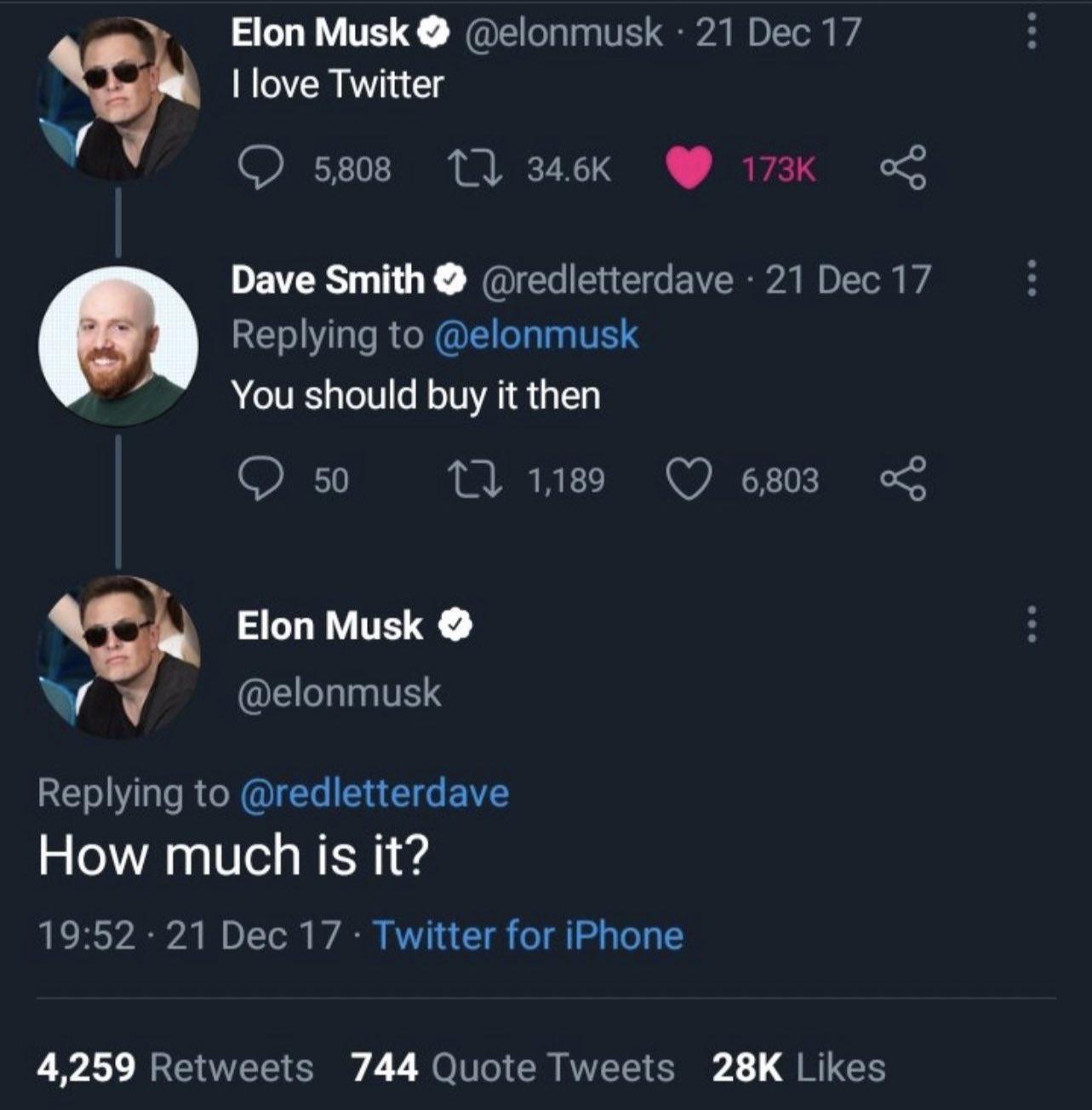
Where it all began, as Musk –perhaps jokingly– contemplates buying Twitter in 2017.
Twitter Usage by Canadians
Twitter is a major source of social media content for Canadians; of all social media through which users consume the news, Twitter is the most popular in Canada (Bush, 2023). “Around 40% of online adults in Canada have a Twitter account and 29% of Canadians with multiple social media accounts say they use Twitter more often than other social media networks” (Bush, 2023). As of September 2023, Twitter has approximately 397 million users, over 8 million of whom are Canadian (Bush, 2023). Of those global users “Almost 40% of global Twitter users are aged between 25 and 34.” While this implies the social media platform is used predominately by younger Millennials (Millennials being between the ages of 27 to 42), over half of Twitter posts are in fact written by Generation Z users (adults aged 26 and younger) (Bush, 2023). Twitter as a platform is both very important for Canadians and leans towards being a younger person’s social media network.
A Concise Background of Twitter
Elon Musk did not purchase Twitter in a political vacuum. Twitter’s journey to becoming one of the largest social networks in the Western world began after the founders of a website for hosting podcasts, “Odeo” felt they could not compete with Apple adding podcasts to iTunes (Britannica, 2023). In response to Apple’s announcement that iTunes would become a podcast host, engineer Jack Dorsey proposed a short-message-service (SMS) that could be used for microblogging (Britannica, 2023). Named “Twttr” initially, the full version debuted in July 2006, and Twitter became its own corporate entity in April 2007 (Britannica, 2023).
Three events each gave Twitter a large boost in its early userbase. First, being presented at the South by Southwest Music and Technology conference in March 2007, preceding its incorporation (Britannica, 2023). Then, the 2008 USA General Election, the first to see mass utilization of social media, saw contender Barack Obama amass 20 times as many followers on Twitter as his opponent John McCain (Britannica, 2023), and consequently the use of social media to sway elections became apparent. Finally, after the successful landing of US Airways flight 1549 on the Hudson River, news of the landing was broken by a tweet from the passenger of a passing commuter ferry; this garnered so much interest so quickly that Twitter’s image-hosting website crashed (Britannica, 2023). This, combined with the use of Twitter as a tool to organize protests against results of the June 2009 Iranian election, also made clear the platform’s emerging utility as a tool for journalists as a means to disseminate information (Britannica, 2023). However, the optimistic view of social media as a tool for grassroots organization and journalism would fade, and Twitter’s role in exacerbating misinformation would come to be better understood and better measured.
In 2018, Vosoughi, Roy, and Aral would conduct an ambitious analysis of open Twitter data, including ~126,000 rumor cascades spread by ~3 million people more than 4.5 million times (Vosoughi et al., 2018, p. 1). This led the researchers to conclude that falsehoods were around 70% more likely to be retweeted than a true news story, and while they had operated with the hypothesis that tweets containing false news needed to have been shared by more active and popular Twitter accounts, they rather found the opposite:
“Users who spread false news had significantly fewer followers… followed significantly fewer people… were significantly less active on Twitter… and had been on Twitter for significantly less time…. Falsehood diffused farther and faster than the truth despite these differences, not because of them” (Vosoughi et al., 2018).
Misinformation on Twitter is nothing new, and political bias has been studied internally by the social network. In 2022, a political bias for which tweets Twitter’s algorithm preferred to promote was made public by the company’s own internal research, “In 6 out of 7 countries studied, the mainstream political right enjoys higher algorithmic amplification than the mainstream political left.” (Huszár et al., 2022). While this is said about how political parties’ tweets are promoted, the same paper also examines how the algorithm promotes the tweets of political news sources and found “Our second set of findings studying the U.S. media landscape revealed that algorithmic amplification favours [sic] right-leaning news sources.” (Huszár et al., 2022, p. 1). The paper was published January 5, 2022, and Elon Musk would purchase Twitter on October 27 of that year.
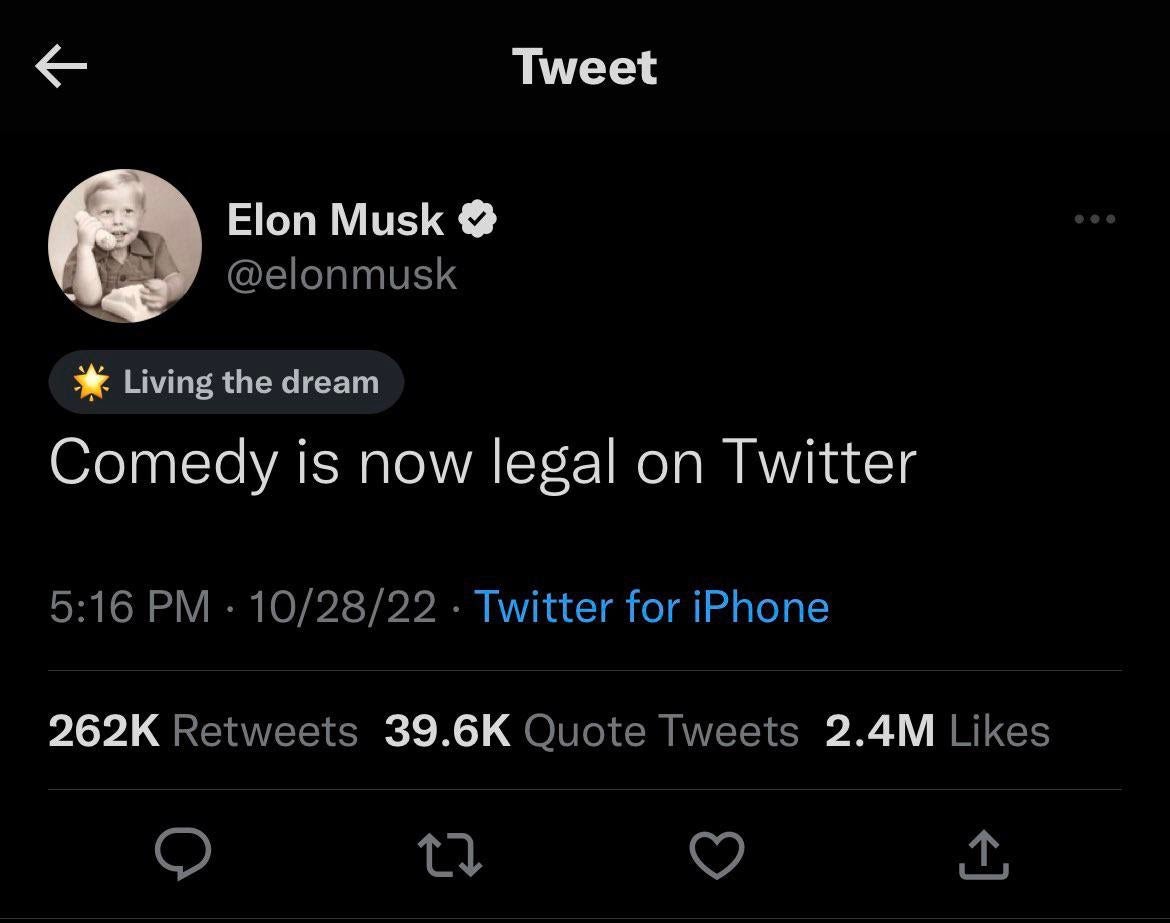
How Elon Musk celebrated his purchase of Twitter.
Elon Musk and Public Relations
Elon Musk has tarnished his reputation among the popular and mainstream media to appeal to a smaller, seemingly more devoted and fringe demographic. When he was once known for electric cars and flamethrowers, he is now seen by this researcher as an infantile and antagonizing Dunning-Kruger example: an incompetent person who is naïve about the breadth of their ignorance, leading them to conclude that they are competent. A plurality of Americans do not share this view of Musk. According to YouGov polling conducted in Q3 of 2023, Elon Musk is liked by 41% of those polled and disliked by 37% of participants, with 18% having a neutral opinion (as cited by Samuels, 2022). This has been a slow fall from April 2022, when “YouGov found that closer to half of U.S. adults (49 percent) had a “very” or “somewhat” favorable opinion of Musk compared with 31 percent who viewed him “somewhat” or “very” unfavorably” (Samuels, 2022). This still represents much greater popularity than this researcher intuitively expected based on how popular media presents Elon Musk, frequently making his belligerence and mistakes a topic of popular discussion.
After more advertisers fled Twitter due to Elon Musk’s provocations, his response to those advertisers in an interview was to tell them to collectively “Go f— yourselves!” while conceding immediately afterwards that it was likely Twitter would not survive without them (Goode, 2023). Elon Musk makes clear his abandonment of the fundamental idea behind public relations when saying, early in the same interview, “It’s a real weakness to want to be liked, a real weakness. I do not have that.” Sorkin pushes back immediately, saying that surely it is beneficial to be trusted rather than liked, and Elon responded that the “track record” of the technology that his other companies produce, Tesla and SpaceX, should account for advertiser trust (Sorkin, 2023), seemingly fundamentally missing the point of the kind of trust Sorkin was asking about. Further, despite this statement to the contrary, Elon Musk does seem to want to need approval of people he meets in public, as his mood supposedly spiraled after being booed publicly at a Dave Chappelle concert in the December of 2022 (Brown, 2022).
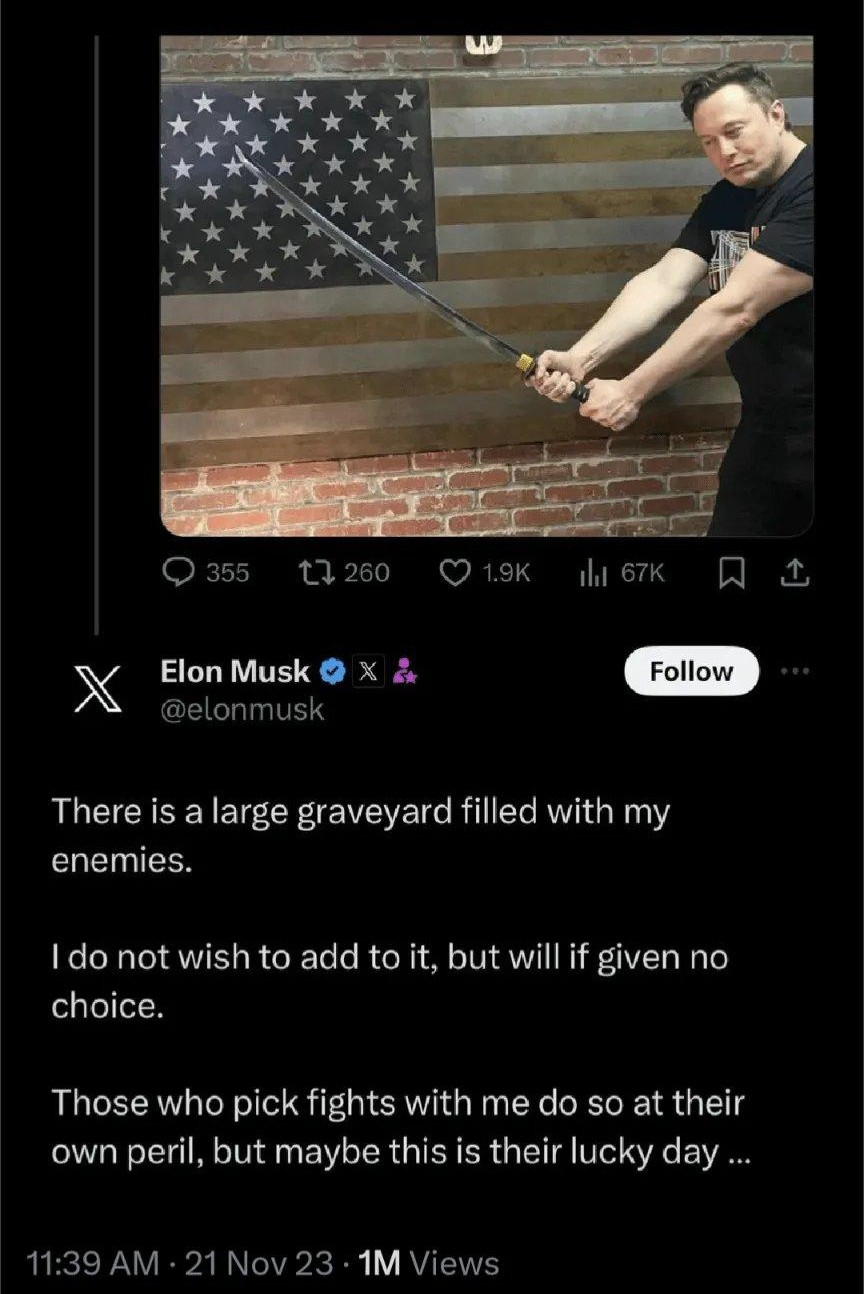
The day after his explicit antisemitism that prompted advertisers to pull from Twitter, he reaches out by posting a photo of himself posing with what appears to be a katana, the caption talking about the grave of his enemies.
Misinformation and Hate on Twitter Under Elon Musk
Hate speech should not be treated as a subjective term, as the Canadian Supreme Court has decided on clear criteria for whether speech should be restricted as hateful. To paraphrase these criteria for brevity, first, an observer of an expression of potential hate speech is expected to ask, “Whether a reasonable person, aware of the context… would view [the expression] as exposing the protected group to hatred” (Saskatchewan [HRC] v. Whatcott, 2013). Second, hatred here is defined as extreme manifestations of detestation and vilification; expression that is detestable and offensive but does not meet the abhorrence indicated by these terms does not apply (Saskatchewan [HRC] v. Whatcott, 2013). Finally, observers are expected to ask: Is it likely that the expression would expose the group in question to hatred by others? The speech author’s intention is not in question, only the likely impact of the expression at hand; if so, it should be restricted as hate speech (Saskatchewan [HRC] v. Whatcott, 2013). This is the definition of hate speech that will be used henceforth in this paper. This researcher will also clarify that protected groups should constitute collections of people with common immutable characteristics.
Elon Musk completed his purchased Twitter on October 27, 2022 (Faber & Vanian, 2022), and he didn’t hesitate before making large-scale changes to the company and to the online platform.
“Among [Elon’s] first acts as Twitter’s owner were to lay off about half the company and allow users to purchase the blue check-mark verification for $8 per month. He also disbanded Twitter’s content-moderation body and reinstated many banned accounts, most notably that of former U.S. president Donald Trump, who had been suspended after the U.S. Capitol attack on January 6, 2021. Advertising revenue fell sharply as many companies withdrew their ads on the platform.” (Britannica, 2023)
Vice writer David Gilbert accused Elon Musk of making Twitter a safer place for Nazis relatively early, in 2022 only a month after his purchase of the platform:
“Musk’s pattern of normalizing far-right content stretches back to well before his takeover of Twitter. Last February, Musk tweeted a meme that compared Canadian Prime Minister Justin Trudeau to Hitler. The tweet, which he deleted within 12 hours of being posted, showed support for the truckers who were protesting vaccine mandates.” (Gilbert, 2022)
Gilbert is arguing, and this researcher is inclined to agree, that the purchase of Twitter did not change Elon Musk so much as it amplified traits that were already present (Gilbert, 2022). It has been hypothesized that being granted increased perceived power induces honesty in people, and Musk may be no exception (Grant, 2019).
Two more things happened in the aftermath of Elon Musk becoming CEO of Twitter: first, there was a measured increase in slurs on the platform as supporters of the purchase “[relished] their ability to use profane slurs and racial epithets” (Gilbert, October 2022). This was not a subjective observation, academic documentation on the quadrupling of hateful tweets post-purchase has since been made publicly available (Hickey et al., 2023). While hate speech fell fallen since the initial spike in the aftermath of the purchase, data shows “The levels of hate speech tend to still reach levels higher than the highest levels from the month before, hinting at a new baseline level of hate speech post-Musk.” (Hickey et al., 2023, p. 3).
Second, in a move that likely explains why, Twitter under Musk’s leadership announced a general amnesty for previously suspended accounts “that had not violated any laws” (Center for Technology and Society, 2023). These accounts include “White nationalist Jason Kessler organizer of the Unite the Right rally, and Richard Spencer, another well-known white nationalist… [and] Brett Stevens, a far-right racist who praised the 2011 mass murder of 77 people in Norway by a convicted terrorist” (Gilbert, 2022). Musk framing himself as a “Free Speech Absolutist” seems intended to imply that he did not agree with their views, only their right to use the platform, however Jared Holt, research manager at the Institute for Strategic Dialogue says, “Far-right communities have celebrated Musk’s perceived sympathies to their causes. Musk has done little to dissuade these impressions. Rather, he has spent his time engaging with far-right personalities, recycling their tropes, and entertaining their grievances” (as quoted by Gilbert, 2022). As explored later in this paper, the notion of “Elon Musk as a neutral arbiter” becomes harder to entertain with any plausibility.
Far-right influencers (accounts with exceptionally high followers that create content for the platform) on Twitter have been given more reason to believe that Elon Musk is one of their number. Apart from reinstatement of many of their previously suspended accounts, Twitter under Musk’s leadership announced a monetization scheme where influencers who qualified would share in advertising revenue (Lorenz, 2023). The next day, many of those influencers were already sharing how much they had made, between $10,400 to over $20,000 American dollars (Lorenz, 2023). The names of those sharing that they had received payment under the program include Ian Miles Cheong, Benny Johnson, Ashley St. Claire, Andrew Tate, Rogan O’Handley, anonymous account End Wokeness, as well as Trump critics Ed and Brian Krassenstein (Lorenz, 2023). How the payouts are calculated, according to Musk, is a proprietary metric of ads served from verified user to verified user, and only after passing a “human review” (Lorenz, 2023); but an anonymous former Twitter executive doesn’t believe this explanation, claiming it is unlike any content monetization Twitter has done in the past: “This just feels pulled out of thin air for a specific subset of creators that he wanted to placate… it really feels like they’re arbitrarily writing checks to people they like” (as quoted by Lorenz, 2023). Rather than provide consistent monetization, these checks seem to signal the kinds of content that Elon Musk and Twitter executives want to see continued on the platform.
Misinformation and hate have measurably increased in the time since Elon Musk has purchased the platform, and since being made aware he has threatened to sue two of the research groups responsible for documenting those tweets (Klepper, 2023) (Falconer, 2023). The first action was taken on July 20, 2023, when “an attorney representing Twitter wrote to the Centre for Countering Digital Hate, alleging that their publications into the rise of hate on the platform were intended to drive advertisers away from it” with the alleged goal of harming Twitter financially (Klepper, 2023). The founder and CEO of the CCDH, Imran Ahmed, stated they had “never received a similar response from any tech company, despite a history of studying the relationship between social media, hate speech and extremism” so he alleges this action had no precedent set before Twitter (Klepper, 2023).
The second action was against the Anti-Defamation League, when Elon Musk threatened to sue via Twitter posts published on September 4, 2023, accusing the ADL of ““trying to kill this platform by falsely accusing it & me of being anti-Semitic” after the nonprofit [sic] reported a spike in hate speech on the platform following the reinstatement of banned accounts there.” (Falconer, 2023). More specifically, the report gives examples of hate speech from 65 reinstated accounts and gives broad recommendations to social media companies “to combat the normalization and spread of hateful ideologies” on their platforms (Center for Technology and Society, 2023). Rather than adhere to this advice, Elon threatened to sue. Since his purchase of Twitter, Elon Musk has done an abysmal job alleviating fears of personal antisemitism, for reasons that will be outlined in the following part.
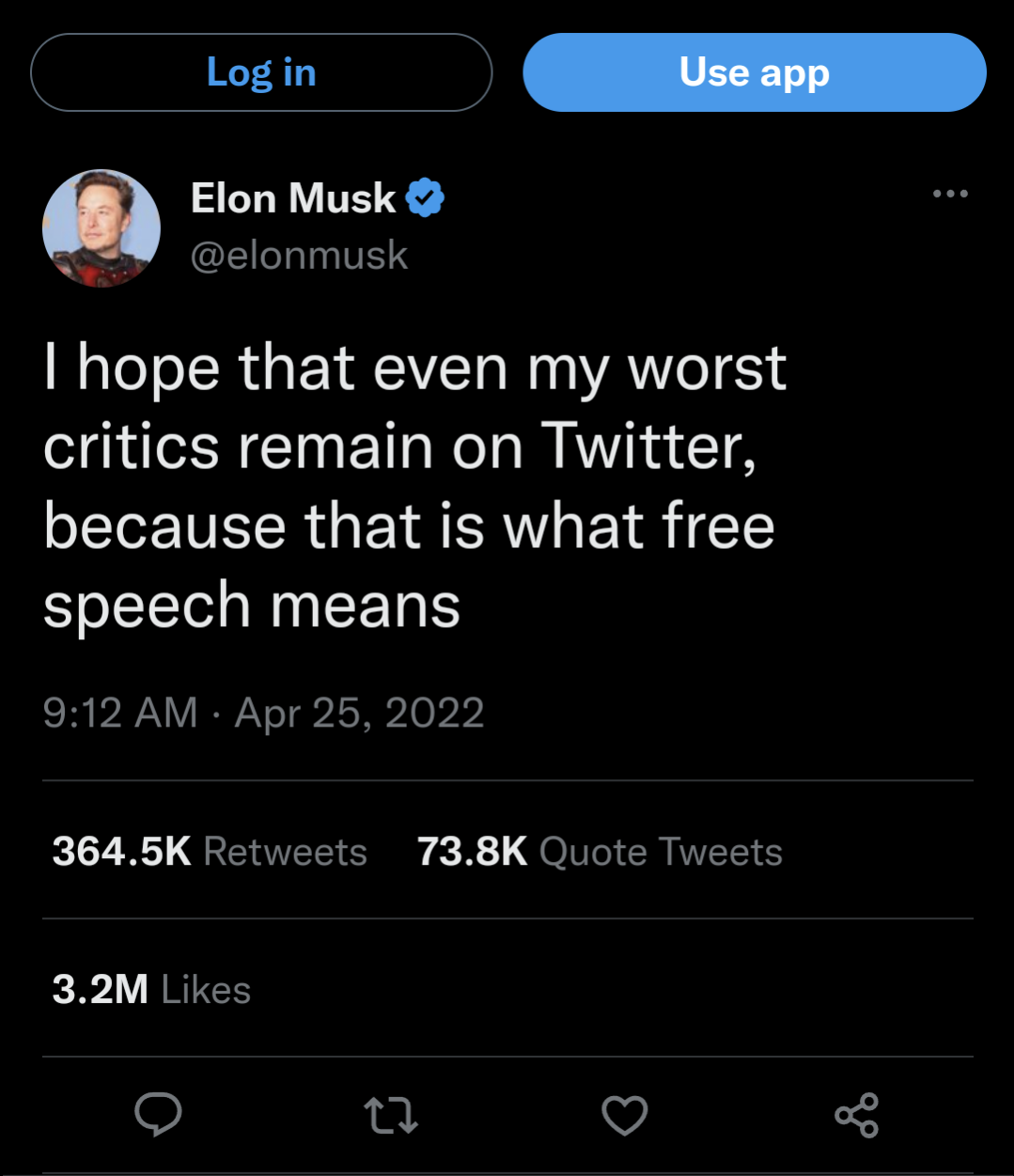
Elon Musk liked to frame himself as a free speech absolutist.
A Three-Part Escalation of Dog Whistles
In the course of researching and writing this paper it became necessary to include a discussion about dog whistles. The adequate definition in the Merriam-Webster dictionary defines a dog whistle as “an expression or statement that has a secondary meaning intended to be understood only by a particular group of people,” and this researcher would add that this secondary meaning is an explicitly political one that is outside acceptable political thought, and not a meaning intended in good-faith humor, or as a niche reference to popular culture (Merriam-Webster, Dog whistle). Elon Musk has engaged in dog whistles on Twitter that have escalated over time, and cannot be ignored by this paper.
On November 26, 2022 someone with the Twitter username rainmaker1973 tweeted that the wildlife in Madagascar was so unique because it had been isolated for 88 million years, with a link to a Wikipedia article on Madagascar (Massimo, 2022). Elon Musk, the same day, responded, “I wonder what Earth will be like 88 million years from now” (Massimo, 2022). Use of the number 88 is a neo-Nazi dog-whistle referring to the phrase “Heil Hitler,” because the letter H is the eighth letter of the alphabet (Southern Poverty Law Center, n.d.). Regardless of Elon Musk’s intention, his responses included many tweets making references to the number 14, which is a reference to fourteen words spoken by a white supremacist leader, and is a dog-whistle in its own right (Gilbert, 2022) (Southern Poverty Law Center, n.d.). Neo-Nazis, white supremacists, and white nationalists frequently pair the numbers together, typically with fourteen first and eighty-eight following. Twitter users posting referencing fourteen in their responses to Musk did so believing that they were confirming having heard the dog whistle. While this may have been a genuine accident on Musk’s part, he did not publicly question the responses or say anything to condemn them. The following day, “Musk got into a Twitter dispute with retired Army Lt. Col. Alexander Vindman, who had posted a message criticizing Musk’s management of the platform. In response, Musk called Vindman “both puppet & puppeteer.”” (Gilbert, 2022). Calling a Jewish person a “puppeteer” plays into longstanding antisemitic tropes outside the scope of this paper (Gilbert, 2022).
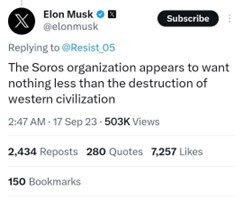
This tweet by Elon Musk resembles not a dog whistle, but a foghorn.
This escalated when, on September 13, 2023, in response to a tweet claiming that George Soros was funding an illegal immigrant invasion of Italy (with no evidence), Elon Musk tweeted “The Soros appears to want nothing less than the destruction of western civilization.” (The Associated Press, 2023). George Soros is a frequent target of criticism as he has donated billions of dollars to liberal causes around the world. Soros is Hungarian-American and Jewish (The Associated Press, 2023), and accusing his organization of wanting the destruction of western civilization plays into antisemitic tropes about Jewish leaders and citizens conspiring to sabotage the nations where they are citizens (typically through immigration, diversity initiatives, and other typically liberal policy) in return for some historical wrong, either a diaspora or the holocaust. If Elon Musk had wanted to be critical of progressive money in politics, there are a plethora of organizations he could be critical of without singling out Soros, who is a frequent target of conservatives (The Associated Press, 2023). It is also entirely fair to criticize the Soros Organization without any need to claim that this organization desires the “destruction of western civilization,” and doing so plays into aforementioned tropes about Jewish people sabotaging nations with immigration (The Associated Press, 2023); for these reasons, the tweet strikes this researcher as an exceptionally clear dog whistle of no ambiguity. The entire point of a dog whistle is plausible deniability, yet Elon Musk would soon cross that line.
Finally, on November 15, Elon Musk read a tweet saying, in short, Jewish communities are hypocrites for pushing “dialectical hatred against whites” and opposing that hatred against themselves, calling antisemitism from immigrants warranted because Jewish people supported the arrival of those immigrants. In response to this tweet blatantly condoning the antisemitic trope discussed in the previous paragraph, Elon Musk tweeted “You have said the actual truth.” This exchange was swiftly followed by condemnation from the White House, as well as IBM, Disney, and others pulling their advertising from Twitter (Montgomery, 2023) (Chan & Hadero, 2023).
In his interview with Andrew Sorkin, Musk made an attempt to moderate his meaning in condoning the tweet: saying that Jewish organisations, in their support of vulnerable minority groups, would often inadvertently support some groups that were vocally antisemitic (Sorkin, 2023). This sanitised reframing of the tweet he had endorsed ignored a part of it: the tweet had also accused Jewish people of pushing “dialectical hatred against whites,” and Musk made no attempt to address that in his lacking explanation. The fact that Elon Musk has engaged in explicit antisemitism while insisting that charges of racism against him are false should be better understood by everyone. Elon Musk has repeatedly condemned antisemitism, but he will only do so without defining it or condemning any specific ideas (Sorkin, 2023).
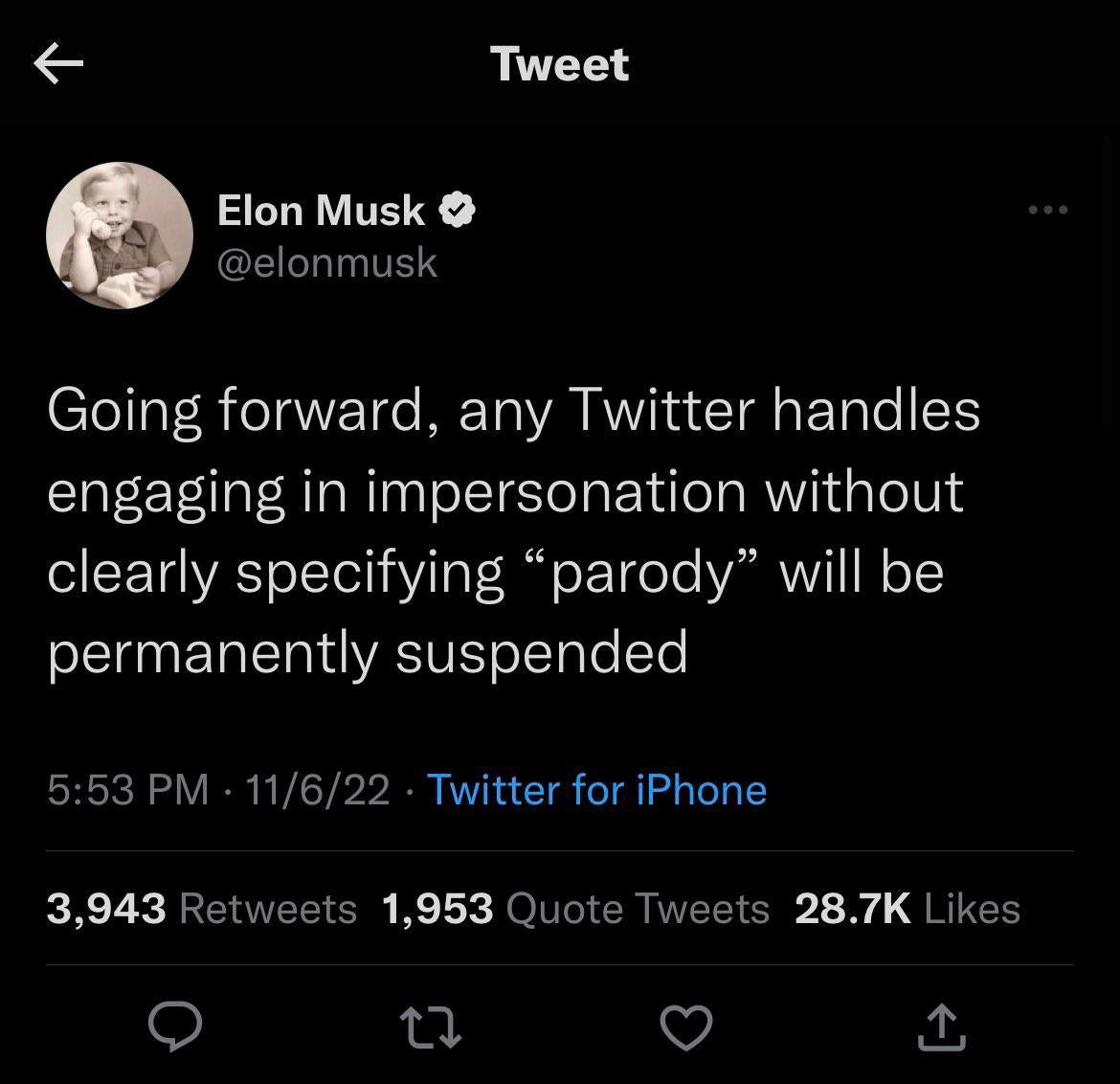
Musk recently said to Andrew Sorkin “Free speech isn’t exactly free, it costs a little bit.”
Solutions for Twitter
The United States Securities and Exchange Commission (SEC), a regulatory body that is supposed to protect investors, has been insufficient with discouraging Elon Musk from Twitting information that manipulates share values as courts have not consistently ruled in their favor; Elon Musk’s recklessness before purchasing was therefore met with minimal accountability (Prentice & Price, 2022). Now that advertisers are pulling out of Twitter, this is starting to change, however late. Even if larger institutions cannot be trusted to keep powerful and influential individuals like Elon Musk accountable, there are methods citizens can employ beyond simple boycotting. Taking proactive screenshots of hateful content posted next to advertisements, and then sending those screenshots public social media pages of the advertisers asking why they are seeking sales next to hateful posts can encourage those advertisers to leave.
Self-styled curatorial journalists such as Seth Abramson have taken to documenting the scandals around Elon Musk and Twitter so they are all organized into one place for viewers to read can also help: It can be easier to cast doubt on the weight individual scandals in isolation merit, but seeing a narrative that exposes a pattern come together can put seemingly isolated actions in context, and make them easier for audiences to appraise and condemn.
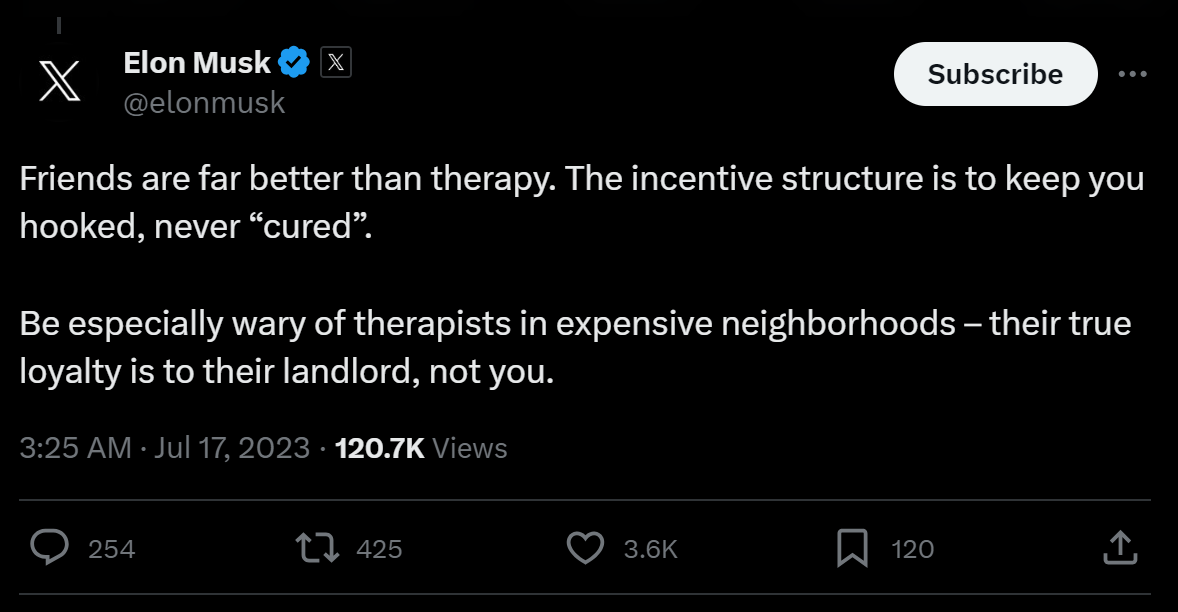
Elon Musk tweets that friends are better than therapy.
Conclusion
The European Union has threatened fines against Twitter equal to 6% of their global revenue for failing to control misinformation on the platform, and in June Elon Musk yielded to EU demands (O’Carroll, 2023), but not before contemplating blocking the social network’s access in the EU (Hayes, 2023). Similar laws should be examined for adaptation in North America, as none currently exist in Canada. Sara Fischer and Mike Allen, both writing for Axios (2013), assert that Elon Musk has effectively replaced Rupert Murdoch as patriarch of Western conservative media, and all the evidence discussed in this paper leads this researcher to endorse this view. Elon Musk may be a businessman first, but he is not exclusively a businessman. He is a culture-warrior, someone who does not simply want to enable public discourse, but also to shape public discourse for the detriment of all.
References
Britannica, T. Editors of Encyclopaedia (2023, October 30). X. Encyclopedia Britannica. https://www.britannica.com/topic/Twitter
Brown, L. (2022, December 12). Elon Musk booed onstage at Dave Chappelle show, blames ‘offended unhinged leftists.’ New York Post. Retrieved November 15, 2023, from https://nypost.com/2022/12/12/unhinged-leftists-elon-musk-booed-at-chappelle-gig/
Bullard. (2023, October 11). Six Months Ago NPR Left Twitter. The Effects Have Been Negligible. Nieman Reports. Retrieved November 15, 2023, from https://niemanreports.org/articles/npr-twitter-musk/
Bush. (2023, March 27). Twitter Statistics in Canada for 2023 – Made in CA. Made in CA. Retrieved October 29, 2023, from https://madeinca.ca/twitter-statistics-canada/
Center for Technology and Society. (2023, May 24). Threads of Hate: How Twitter’s Content Moderation Misses the Mark. ADL. Retrieved November 3, 2023, from https://www.adl.org/resources/blog/threads-hate-how-twitters-content-moderation-misses-mark
Chan, K., & Hadero, H. (2023, November 17). IBM pulls ads from Musk’s X after report says they appeared next to antisemitic posts. ABC News. Retrieved November 24, 2023, from https://abcnews.go.com/US/wireStory/ibm-pulls-ads-elon-musks-after-report-appeared-104975720
Daniels. (2017, October 19). Twitter and White Supremacy, A Love Story. Dame Magazine. Retrieved November 3, 2023, from https://www.damemagazine.com/2017/10/19/twitter-and-white-supremacy-love-story/
Faber, & Vanian. (2022, October 27). Elon Musk now in charge of Twitter, CEO and CFO have left, sources say. CNBC. Retrieved November 17, 2023, from https://www.cnbc.com/2022/10/27/elon-musk-now-in-charge-of-twitter-ceo-and-cfo-have-left-sources-say.html
Falconer, R. (2023, September 4). Elon Musk threatens to sue Anti-Defamation League after blaming it for X ad sales slump. Axios. https://www.axios.com/2023/09/04/elon-musk-anti-defamation-league-x-ad-sales-slump
Gilbert, D. (2022, October 22). Neo-Nazis, Antisemites, and the N-Word: Twitter Just Hours Under Elon Musk. Vice. Retrieved November 24, 2023, from https://www.vice.com/en/article/jgpkqb/elon-musk-twitter-neo-nazis
Gilbert, D. (2022, November 29). Elon Musk Is Turning Twitter Into a Haven for Nazis. Vice. Retrieved November 2, 2023, from https://www.vice.com/en/article/n7zm9q/elon-musk-twitter-nazis-white-supremacy
Grant, A. (2019, February 22). Power doesn’t corrupt. It just exposes who leaders really are. Washington Post. Retrieved November 20, 2023, from https://www.washingtonpost.com/business/economy/power-doesnt-corrupt-it-just-exposes-who-leaders-really-are/2019/02/22/f5680116-3600-11e9-854a-7a14d7fec96a_story.html
Hays, K. (2023, October 18). Elon Musk is considering taking X out of Europe amid EU compliance investigation. Business Insider. Retrieved December 8, 2023, from https://www.businessinsider.com/elon-musk-considering-taking-twitter-x-out-of-europe-dsa-2023-10
Hickey, D., Schmitz, M., Fessler, D., Smaldino, P. E., Muric, G., & Burghardt, K. (2023, June 2). Auditing Elon Musk’s Impact on Hate Speech and Bots. Proceedings of the International AAAI Conference on Web and Social Media, 17, 1133–1137. https://doi.org/10.1609/icwsm.v17i1.22222
Klepper, D. (2023, July 31). Musk threatens to sue researchers who documented the rise in hateful tweets. AP News. Retrieved November 2, 2023, from https://apnews.com/article/elon-musk-lawsuit-cchd-twitter-x-hate-speech-extremism-434a80631f9e76833ee30387c04dd290
Lorenz, T. (2023, July 14). Far-right Twitter influencers first on Elon Musk’s monetization scheme. Washington Post. https://www.washingtonpost.com/technology/2023/07/13/twitter-creators-payments-right-wing/
Massimo [@Rainmaker1973]. 2022, November 26. Madagascar wildlife is so unique. [Image of a lemur attached] [link to Wikipedia] [Tweet]. X. https://twitter.com/elonmusk/status/1596439328338890752?lang=en
Merriam-Webster. (n.d.). Dog whistle. In Merriam-Webster.com dictionary. Retrieved November 20, 2023, from https://www.merriam-webster.com/dictionary/dog%20whistle
Montgomery, B. (2023, November 17). White House condemns Elon Musk’s ‘abhorrent’ antisemitic tweets. The Guardian. Retrieved November 20, 2023, from https://www.theguardian.com/technology/2023/nov/17/white-house-biden-elon-musk-antisemitic-tweet-hate
O’Carroll, L. (2023, June 23). Twitter agrees to comply with tough EU disinformation laws. The Guardian. https://www.theguardian.com/technology/2023/jun/23/twitter-agrees-to-comply-with-tough-eu-disinformation-laws
Prentice, C., & Price, M. (2022, May 24). Insight: In a faceoff with Elon Musk, the SEC blinked. Reuters. https://www.reuters.com/markets/us/faceoff-with-elon-musk-sec-blinked-2022-05-24/
Samuels, A. (2022, December 23). How Americans Really Feel About Elon Musk. FiveThirtyEight. https://fivethirtyeight.com/features/how-americans-really-feel-about-elon-musk/
Fischer, S., & Allen, M. (2023, May 24). Elon Musk displaces Rupert Murdoch, Fox News to be king of conservative media. Axios. Retrieved December 6, 2023, from https://www.axios.com/2023/05/24/musk-murdoch-twitter-conservative-media
Sorkin, A. R. (2023, November 30). Elon Musk on Advertisers, Trust and the “Wild Storm” in His Mind (Dealbook Summit 2023, Interviewer) [Video]. YouTube. Retrieved December 8, 2023, from https://www.youtube.com/watch?v=2BfMuHDfGJI
Saskatchewan (Human Rights Commission) v. Whatcott (2013), SCC 11 (CanLII), [2013] 1 SCR 467, https://canlii.ca/t/fw8x4, retrieved November 15, 2023
Southern Poverty Law Center. (n.d.). Racist Skinhead Glossary. Retrieved December 8, 2023, from https://www.splcenter.org/fighting-hate/intelligence-report/2015/racist-skinhead-glossary
The Associated Press. (2023, September 18). Elon Musk accuses George Soros of wanting “destruction of western civilization” a day before meeting Netanyahu over antisemitism on X. Fortune. Retrieved November 20, 2023, from https://fortune.com/2023/09/18/elon-musk-george-soros-antisemitism-israel-benjamin-netanyahu-twitter-x/
Vosoughi, S., Roy, D., & Aral, S. (2018, March 9). The spread of true and false news online. Science, 359(6380), 1146–1151. https://doi.org/10.1126/science.aap9559